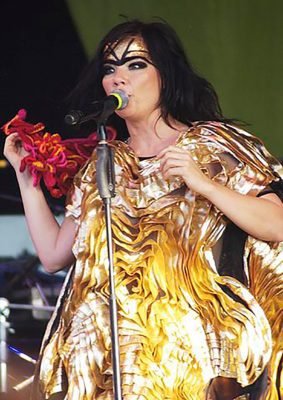
When one considers the concept of a utopia, it is often discussed as the peak or perfection of a society. In Björk’s “Utopia,” the artist utilizes this concept to portray a musing of how humans can come to terms with trying to reach this perfect state.
On her previous album, “Vulnicura,” the sense of isolation and desolation was present within many of the songs. Björk seems to have accepted faults in love and loss to now create her “Utopia,” a world in which she attempts to regain optimism through the feelings of love and intimacy.
The music presents an out-of-body experience, her sound relaying a vibe that puts the listener in another world. It strikes an emotional response not just from the sound itself, but the lyrics have another message to portray.
While Björk’s instrumentation can leave a listener feeling a variety of emotions — from irritated to inspired — the summation of these sounds is, at the core, complex.
The songs do not follow any set rhythm. Rather, the beats work on top of each other to progress her voice throughout the entire piece. In “Utopia,” the background music is interestingly vibrant and natural, interspersing natural elements with the celestial.
Björk definitely wins with the uniqueness of her sound. And lyrically, the album bears a philosophical importance.
The introductory song on the album, “Arisen My Senses,” begins with the combination of melodic and experimental themes, a fusion that ramps up to what can be equated to the sound of rebirth.
Her intermittent vocals toward the beginning of the song, singing, “Just that kiss / Was all there is,” amplifies the simple action that overloads the emotions of so many in love. Björk hits the nail on the head — “Every cell in my body / Lined up for you.”
One of the singles released prior to the official album release, “Blissing Me,” comes next. This song is a highlight, with Björk telling a tale of a modern love, exaggerating the many types of interactions people are capable of with access to the online sphere.
“I’m celebrating on a vibrancy,” she sings. “Sending each other MP3s / Falling in love to a song.”
In “The Gate,” Björk assumes a tone of desperation and darkness, but the lyrics portray a different narrative.
She tells of accepting love, her “healed chest wound” transforming into a gate to “receive love from.” Björk incites a situation common to all of those who are in love, yearning for reciprocation of their own contributions.
The title track, “Utopia,” is short in terms of lyrical content, but takes on one of the highest philosophical points for the album.
In the final verse, Björk sings, “Huge toxic tumor bulging underneath the ground here / Purify, purify, purify, purify toxicity.”
The lines may symbolize the past as the foundation for an individual, and instead of trying to expunge everything built up there, Björk muses to “purify” the air instead, another symbol standing for the future.
Another powerful line in the song, “Utopia / It isn’t elsewhere / It’s here,” is a poignant statement that contradicts the conventional idea surrounding what a utopia is. Björk tries to reconcile with her own mistakes by creating her destiny in the present instead of looking for another hopeful place.
“Features Creatures” has a more anecdotal style, with Björk telling of finding her love in the simplicity of daily interaction. She begins to inspire a new hope in herself as she chimes, “I literally think I am five minutes away from my love.”
While Björk continues to contemplate the meaning of the past, in “Losss,” she dives into a full analysis.
The heartfelt voice over a harmonic beat, with the slight interference of electronic sound that has become Björk’s staple, gives off the sense of discovery that “Losss” aims to represent. As Björk can “forgive, the past is bondage,” she understands the greatness freedom and the future hold, an “aphrodisiac.”
The final track, “Future Forever” works beautifully as the ode for the entirety of “Utopia.” Björk emphasizes the letting go of your past to truly discover the future. In a wonderfully crafted song, she stresses, “Hold fort for love forever” and “Your past is on loop, turn it off.”
It is a conclusive track in “Utopia,” where Björk rediscovers what it means to be human — expressing the need to live in the future instead of dwelling over the mistakes of the past.
























































































































